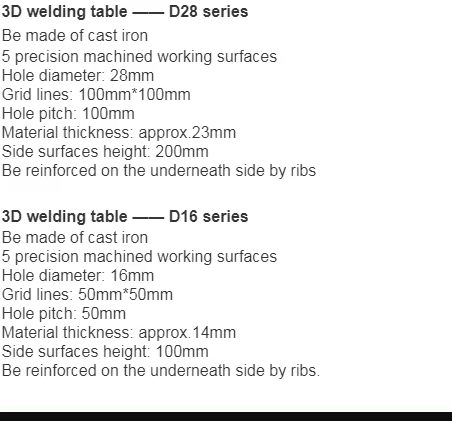9 月 . 29, 2024 03:50 Back to list
Understanding Standard Plug Gauge Use and Applications in Precision Measurement Techniques
Understanding Standard Plug Gauges A Comprehensive Overview
In the realm of precision engineering and manufacturing, ensuring that products meet specific dimensional tolerances is crucial for quality assurance and functionality. One of the fundamental tools used in quality control is the standard plug gauge. This article delves into the concept of standard plug gauges, their types, applications, and significance in various industries.
What is a Standard Plug Gauge?
A standard plug gauge is a cylindrical tool used to measure the internal diameter of holes or the thickness of materials. Plug gauges are typically designed to a specific dimension, which serves as a reference point to determine whether the measured item falls within acceptable tolerances. By inserting the gauge into a hole, operators can quickly ascertain whether the size is too large, too small, or within the desired specifications.
Types of Plug Gauges
Plug gauges can be categorized into two primary types Go Gauges and No-Go Gauges.
1. Go Gauges These are designed to fit into the target hole or opening. If the Go gauge passes through or fits snugly, it indicates that the measurement is within tolerance and acceptable for production. If it does not fit, the dimension is considered too small.
2. No-Go Gauges In contrast, No-Go gauges are intended to not fit into the hole. If the No-Go gauge can be inserted, it signifies that the hole is too large and exceeds the acceptable limit. Consequently, both gauges work together to ensure that the dimensions of a part are within defined tolerances.
Material and Construction
Standard plug gauges are typically made from high-grade tool steel, ensuring durability and resistance to wear. Some gauges might also be coated or treated to enhance their hardness and corrosion resistance. The design must allow for precise calibration, which is essential for maintaining accuracy in measurements over time.
Calibration and Maintenance
For a plug gauge to maintain its accuracy and reliability, regular calibration is necessary. Calibration involves comparing the gauge to a standard reference, typically conducted using highly precise measuring instruments. The frequency of calibration depends on usage, but it is advisable to perform checks periodically, especially in high-volume production settings.
standard plug gauge

Additionally, proper maintenance is crucial. Operators should routinely clean the gauges to prevent the buildup of debris or contaminants that could affect measurement accuracy. Storing gauges in protective cases when not in use will also help preserve their integrity.
Applications of Standard Plug Gauges
Standard plug gauges find applications across various industries
- Manufacturing In manufacturing environments, plug gauges ensure that components meet necessary specifications before assembly. This can apply to everything from automotive parts to electronics.
- Aerospace Precision is paramount in the aerospace industry, where plug gauges are employed to verify the dimensions of components that will be subjected to extreme conditions.
- Construction In construction and civil engineering, plug gauges help verify the dimensions of drilled holes in materials like concrete and steel, ensuring structural integrity.
- Medical Devices The healthcare industry relies on plug gauges to guarantee that medical devices and implants fit correctly, which is critical for patient safety and functionality.
The Significance of Plug Gauges in Quality Control
The use of standard plug gauges is vital for maintaining the quality and reliability of manufactured products. By implementing these gauges in the quality control process, companies can reduce the risk of defects, enhance customer satisfaction, and comply with regulatory standards. Additionally, efficient measurement processes contribute to reduced waste and lower production costs.
Conclusion
Standard plug gauges are indispensable tools in the domain of precision measurement and quality control. Their straightforward design belies their importance in ensuring that components meet stringent quality standards. By facilitating accurate measurements, standard plug gauges contribute significantly to the efficiency and effectiveness of various industries, making them a crucial part of modern engineering practices. Whether in manufacturing, aerospace, construction, or healthcare, the role of plug gauges in ensuring quality cannot be overstated. Understanding and utilizing these gauges effectively can lead to improved product outcomes and enhanced operational success.
-
Y Type Strainers: A Comprehensive GuideNewsOct.18,2024
-
Understanding Water Valve Options for Your NeedsNewsOct.18,2024
-
Functions and TypesNewsOct.18,2024
-
An Essential Component for Fluid SystemsNewsOct.18,2024
-
Adjustment and ReplacementNewsOct.18,2024
-
Slow Closing Check Valves: A Key Component in Fluid SystemsNewsOct.08,2024
Related PRODUCTS









